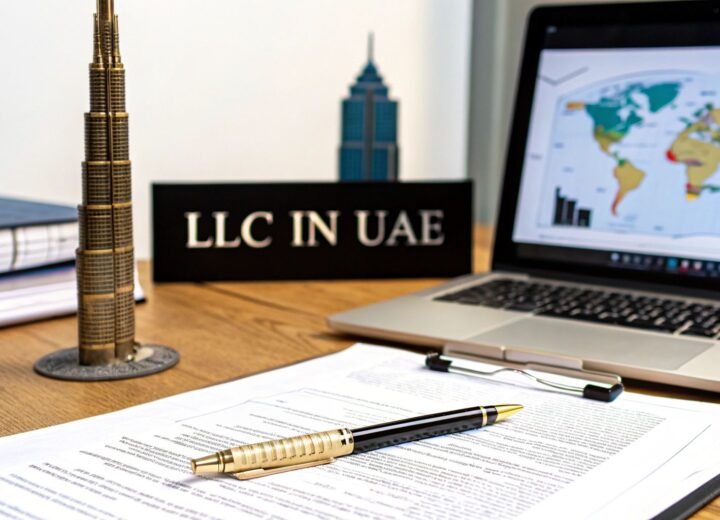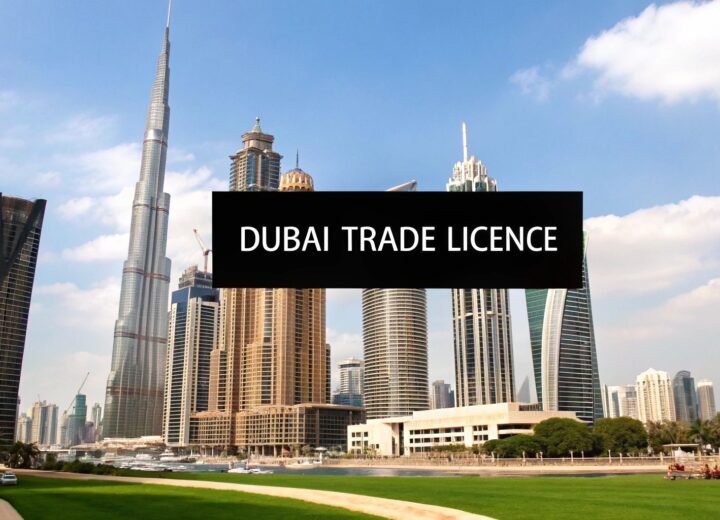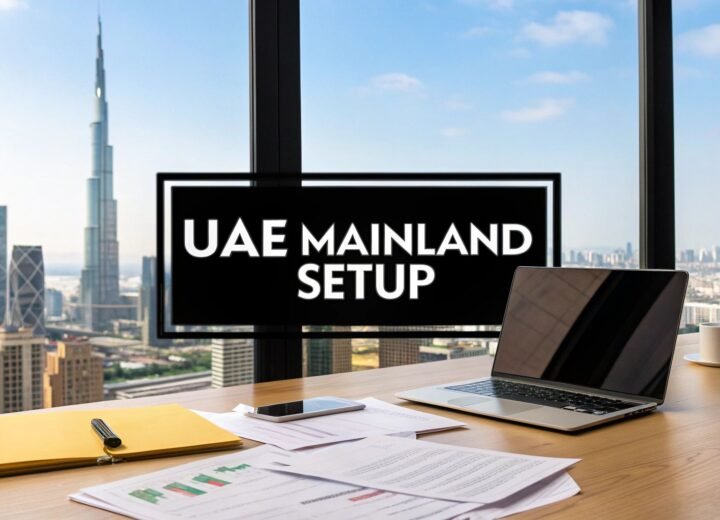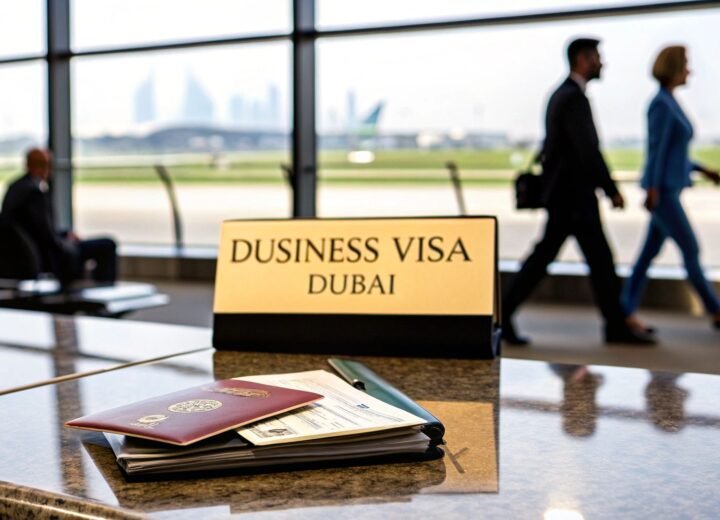When you decide to take your business international, one of the first and most critical questions you'll face is where to set up your corporate structure. For a growing number of entrepreneurs worldwide, the answer is the United Arab Emirates.
Setting up an offshore company in the UAE can be a game-changer for international trade, asset protection, and global investment. But it’s vital to understand exactly what this structure is—and what it isn’t.
An offshore company in the UAE, registered in jurisdictions like RAK ICC or JAFZA, is fundamentally a non-resident entity. This means it’s legally based in the UAE but is built to conduct business exclusively outside the country. You won't be trading in the local market, leasing a physical office, or sponsoring residency visas with this setup.
What’s the Real Advantage of a UAE Offshore Company?
The appeal of going offshore in the UAE comes down to a specific set of benefits designed for global operations. These advantages create a solid foundation for both financial efficiency and robust asset security.
- Complete Foreign Ownership: You maintain 100% ownership of your company. There's absolutely no need for a local partner or sponsor.
- Full Profit Repatriation: All your capital and profits can be moved out of the country without any restrictions holding you back.
- Asset Protection and Confidentiality: The legal framework here acts as a secure shield for your assets, all while keeping the identities of shareholders and directors confidential.
- Access to a World-Class Banking System: The UAE’s banking sector is known for its stability and sophistication, offering reliable and advanced services perfect for international transactions.
Making Sense of UAE Company Structures
To make the right choice, it’s crucial to see the difference between the three main types of company structures available in the UAE. Each one serves a distinct purpose and aligns with very different business goals.
Think of it like this: an offshore company is your vehicle for global trade and holding assets. A free zone company is for operating within a specific economic zone while also trading internationally. A mainland company is for doing business without restriction across the entire UAE market.
A primary driver for many who establish an offshore company here is integrating it into advanced high net worth tax strategies. This move enables far greater control and optimization of their global assets.
Getting these distinctions right from the very beginning is the first step toward building a successful international business. Our team is available 24/7 to help you navigate these choices. For a free consultation on which structure fits your vision, 💬 WhatsApp Us Today for a Free Consultation.
Choosing Your Ideal UAE Offshore Jurisdiction
Picking the right jurisdiction is easily the most critical decision you'll face when you decide to open an offshore company and bank account. This isn't just about comparing annual fees; it's about matching a specific legal framework to your long-term business ambitions. In the UAE, two names consistently come up: RAK ICC and JAFZA Offshore.
It's crucial to understand their core differences from the get-go. One isn’t flat-out "better" than the other—they're simply built for different missions. Your business model is what will ultimately point you to the perfect fit.
The infographic below gives you a bird's-eye view of global company formation hubs, which really sets the stage for why the UAE is such a strategic choice.
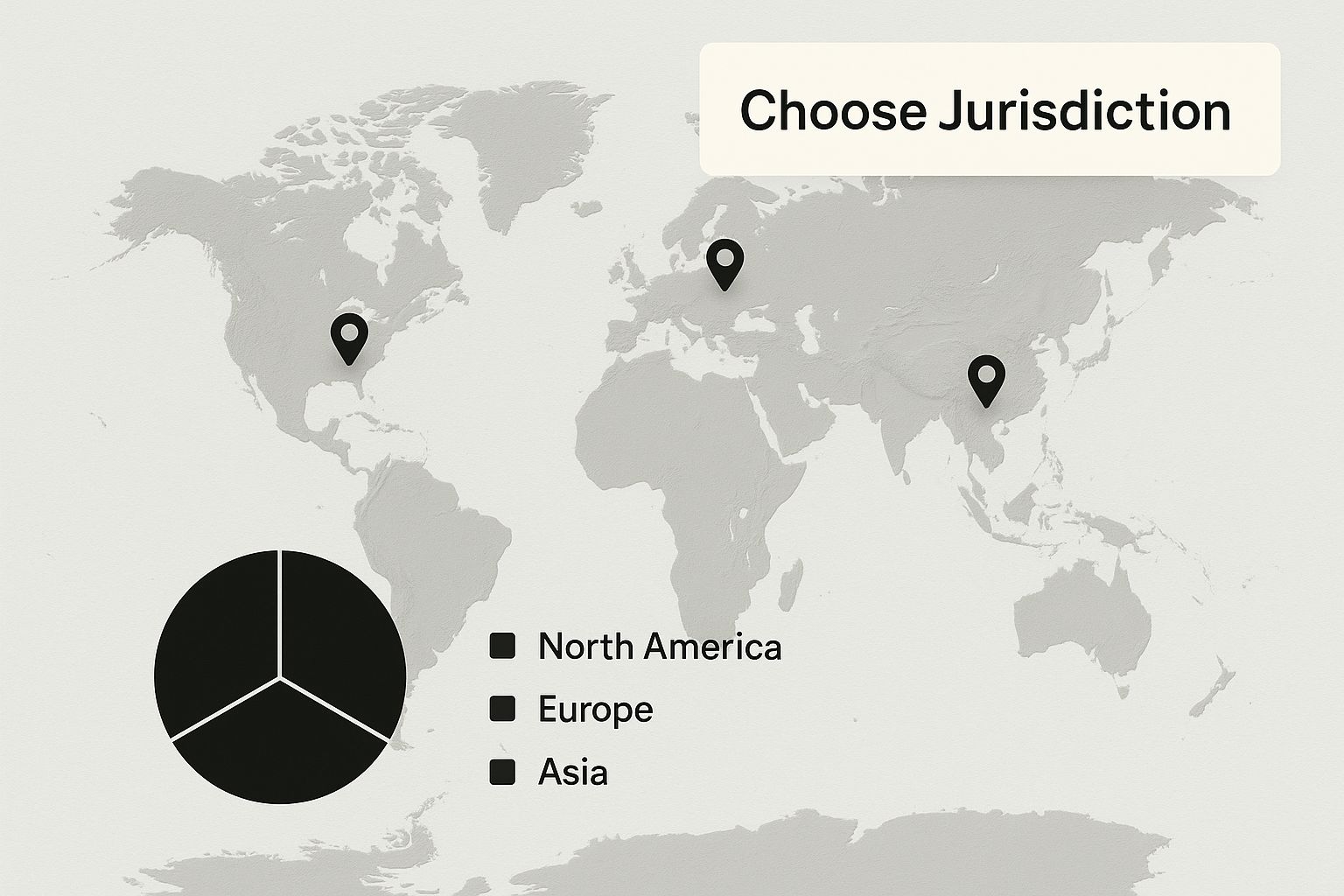
This map shows just how central the UAE is, highlighting its role as a key gateway for entrepreneurs from around the world.
RAK ICC: The Global Business Hub
Ras Al Khaimah International Corporate Centre, or RAK ICC, is known far and wide for its flexibility and cost-effectiveness. It has quickly become the preferred option for international entrepreneurs who need a modern, efficient, and solid corporate structure without the heavy price tag.
Think of RAK ICC as a versatile toolkit for global business. Its legal framework is perfect for a huge range of activities that don’t need a physical footprint in Dubai.
Here are a few real-world situations where RAK ICC really shines:
- Holding Intellectual Property: A global e-commerce brand could use a RAK ICC company to hold its trademarks, patents, and software licenses, keeping these vital assets safe under a secure legal umbrella.
- International Trading: Imagine a consulting firm with clients across Europe and Asia. A RAK ICC entity is perfect for invoicing international clients and managing finances smoothly.
- Global Investments: An entrepreneur juggling a portfolio of international stocks, bonds, or other securities can set up a RAK ICC holding company to consolidate and protect their assets.
RAK ICC's true strength is its lean corporate requirements. It's built from the ground up to support international business without being tied to one location, making it ideal for today's borderless entrepreneur.
JAFZA Offshore: The Dubai Asset Specialist
Jebel Ali Free Zone Authority (JAFZA) Offshore is a premium, highly respected jurisdiction with direct ties to one of the world's biggest and most prestigious free zones. Its standout feature? A specific legal provision that allows it to own real estate anywhere in Dubai.
This single feature makes JAFZA the clear winner for investors whose main goal is to hold property in the Emirate. If your plans involve Dubai real estate, the conversation usually starts and ends with JAFZA.
Here’s a practical example: A high-net-worth individual planning to buy several residential properties in Dubai Marina would set up a JAFZA Offshore company. This structure lets them hold the property titles securely, which dramatically simplifies things like succession planning and asset management down the line.
Offshore companies in Dubai are typically set up under RAK ICC or JAFZA. To recap, JAFZA is tailored for holding assets and real estate inside Dubai, whereas RAK ICC is the go-to for international trade, protecting intellectual property, and keeping corporate obligations light. The setup process is surprisingly fast; most offshore firms can be incorporated in less than a week, especially when a professional service provider handles the paperwork. Plus, international entrepreneurs can enjoy UAE tax benefits, as these companies enjoy 100% profit repatriation and no corporate tax on non-UAE income, since the UAE’s 9% corporate tax only applies to mainland companies earning over AED 375,000.
RAK ICC vs JAFZA Offshore At a Glance
So, how do you make the final call? The best way is to see them side-by-side. This table breaks down the key features that matter most to entrepreneurs.
| Feature | RAK ICC (Ras Al Khaimah) | JAFZA Offshore (Dubai) |
|---|---|---|
| Primary Use Case | International trade, IP holding, global investments | Holding Dubai real estate, asset protection |
| Dubai Property Ownership | Not permitted | Permitted |
| Reputation | Globally recognized, modern and flexible | Premium, long-standing, and prestigious |
| Setup Cost | Generally more cost-effective | Higher initial and annual fees |
| Shareholder Confidentiality | High level of privacy maintained | High level of privacy maintained |
| Annual Reporting | Simplified requirements | More stringent reporting obligations |
This comparison makes it clear that your choice depends entirely on your specific needs. RAK ICC offers flexibility and value, while JAFZA provides a premium solution for Dubai-based asset ownership.
While RAK ICC and JAFZA are the big two, it's good to know other options are out there. For those looking for slightly different advantages, it's worth taking a look at Ajman Offshore company formation as a potential alternative.
Ultimately, choosing between them is a strategic decision. With our 24/7 support service, we can hop on a free consultation to analyze your business goals and recommend the jurisdiction that will be the perfect launchpad for your success. We’re always here when you need us, so 💬 WhatsApp Us Today for a Free Consultation to get started.
Getting Your Offshore Company Up and Running
Once you’ve pinpointed the best jurisdiction, it’s time to bring your offshore company to life. This part of the journey might seem intimidating, but it’s really just a logical sequence of steps. Get them right, and the whole process can be surprisingly smooth.
Think of it as turning your business plan from a concept on paper into a legally recognized international entity. When you're working with corporate service specialists, they handle all the tricky details, letting you stay focused on your bigger business goals.
Naming and Reserving Your Company
The first real step is choosing a name for your offshore company. This isn't just about branding; the name has to follow the specific rules of your chosen jurisdiction, whether that's RAK ICC, JAFZA, or another authority.
Typically, the name must end with a legal suffix like "Limited" or "Ltd." to show its corporate status. You also can't use words that suggest a government connection or activities you aren't licensed for, such as "Bank" or "Insurance."
After you've picked a suitable and unique name, it gets formally reserved with the registrar. This ensures no one else can grab it while your application is being processed.
Preparing Your Essential Documentation
With the name secured, the next task is gathering all the necessary paperwork. This is where most of the heavy lifting happens, and getting every detail right is crucial to avoid any hold-ups. Both banks and regulators need to have a crystal-clear picture of who owns and controls the company.
Your documentation checklist will almost always include:
- Certified Passport Copies for every shareholder and director to verify their identities.
- Proof of Residential Address, usually a recent utility bill or bank statement that’s no more than three months old.
- A Detailed Business Plan that clearly explains what your company does, who your customers are, and how you expect to make money.
- A Curriculum Vitae (CV) for each shareholder, giving a brief of their professional history.
- Know Your Customer (KYC) Forms, which are a standard requirement for compliance and anti-money laundering checks.
A professional partner makes a huge difference here. They don't just hand you a list; they'll go through each document to check for compliance, manage any required attestations, and make sure the entire package is perfectly organized before it's sent off. This proactive step helps prevent common rejections and keeps the whole process moving forward without a hitch. As specialists in Corporate PRO and Attestation Services, we ensure every detail is handled correctly.
Submission and Receiving Your Corporate Documents
Once your application package is complete and has been double-checked, it's formally submitted to the relevant offshore authority. The registrar then reviews everything to make sure it all lines up with the legal standards. This review is usually quite fast, often taking just a few working days.
When your application is approved, you'll receive your official corporate documents. This is a big moment—it's the point where your company officially becomes a legal entity. The most important document you’ll get is the Certificate of Incorporation.
This certificate is basically your company's birth certificate, confirming its legal existence and registration number. You'll also get other key documents like the Memorandum and Articles of Association (MOA/AOA), which set out the company's internal rules and management structure. If you want to dive deeper, you can learn more about the importance of the Certificate of Incorporation in the UAE in our detailed guide.
From start to finish, the incorporation journey is a clear, manageable process when you break it down like this. With the right guidance, what looks like a mountain of paperwork becomes a straightforward, hands-off experience. This frees you up to get ready for the final, and most critical, step: opening your corporate bank account.
Navigating the UAE Offshore Bank Account Process
Successfully opening your corporate bank account is where all your strategic planning finally pays off. While getting the company incorporated is often pretty straightforward, this next stage is usually the most challenging part of the journey to open an offshore company and bank account. Let's be frank about why that is.
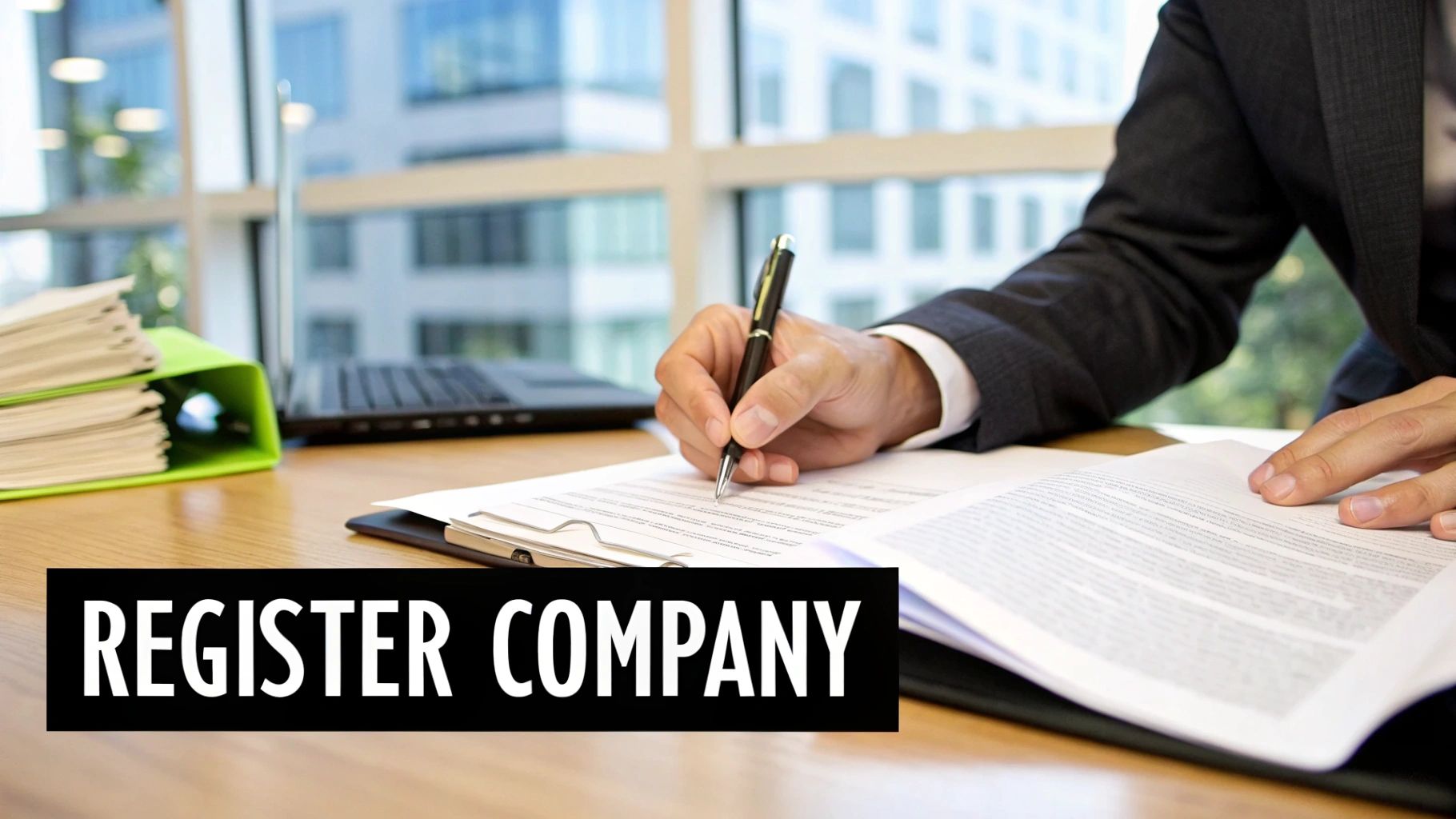
The UAE has worked hard to become a respected global financial hub, and that means aligning with tough international compliance standards. For you, this translates to banks conducting extremely rigorous due diligence on every single application, especially for non-resident entities like offshore companies.
The days of just filling out a few forms are long gone. Today, it’s all about proving the legitimacy and substance of your business.
Understanding the Bank’s Perspective
To get your application approved, you need to start thinking like a compliance officer. Their entire job is to manage risk. They're looking at your file and asking themselves: Does this business pose a risk of financial crime, reputational damage, or regulatory penalties?
Your application needs to answer all their unasked questions before they even have a chance to voice them. It's about building a narrative of trust and total transparency from the get-go. This is precisely why a strong, clear, and well-documented application isn't just a good idea—it's non-negotiable.
The Core Pillars of a Successful Application
Your application essentially stands on three pillars. If any one of them is weak, the whole thing can come tumbling down, leading to long delays or an outright rejection.
- Transparent Ownership Structure: Banks must know exactly who owns and controls the company. You have to clearly identify every Ultimate Beneficial Owner (UBO) and provide verified ID and proof of address for anyone with a significant stake. No ambiguity here.
- A Compelling Business Plan: Think of your business plan as your pitch. It needs to clearly outline your revenue model, target markets, key suppliers, and the kinds of transactions you expect. Vague descriptions like "international trading" are immediate red flags for any banker.
- Verified Source of Funds: You must show credible evidence of where the initial capital for your business is coming from. This could be personal bank statements, investment portfolio records, or audited accounts from another one of your businesses.
Banks in the UAE now emphasise compliance more strictly than ever. They require companies to demonstrate a fully transparent ownership structure, licensed activities aligned with AML/CFT standards, and a well-documented source of funds, especially for higher-risk sectors like crypto, forex, and online gaming. These stringent banking requirements mean offshore companies must prepare extensive documentation to obtain and maintain bank accounts.
Preparing for Your Meeting with the Banker
While you can handle some of the initial steps from abroad, most UAE banks will require a face-to-face meeting with the company signatories. This is your chance to make a solid impression and give the bank confidence in you and your business.
Treat this meeting like a high-stakes business interview. Be ready to walk them through your business plan in detail, answer questions about your professional background, and clearly explain why you've chosen the UAE for your banking. Showing up prepared and articulate demonstrates that you're a serious professional.
Common Red Flags That Lead to Rejection
Knowing what causes banks to say "no" is just as crucial as knowing what they want to see. Steer clear of these common pitfalls, and you’ll dramatically increase your odds of success.
- Vague Business Descriptions: Using generic terms like "consulting" or "general trading" without getting into specifics is a major turn-off for banks.
- Overly Complex Structures: Unnecessarily complicated ownership chains with multiple layers of holding companies can look suspicious.
- Inconsistent Documentation: If names, addresses, or other details don't match up across your documents, your application will grind to a halt.
- High-Risk Jurisdictions: If shareholders are from countries on international high-risk or sanctioned lists, expect intense scrutiny. These applications are very likely to be rejected.
Navigating the complexities of opening a business bank account in Dubai requires a real understanding of the local banking culture and compliance norms.
The whole process is meticulous, no doubt about it. But with the right preparation and guidance, it's completely achievable. By focusing on transparency, clarity, and rock-solid documentation, you can build the financial foundation your global enterprise needs.
📞 Call Us Now: +971-54-4710034 to talk about how we can create a cost-effective business setup solution tailored to your needs.
Using Your UAE Offshore Company for Global Growth
So, you’ve got your company incorporated and the bank account is live. Now the real fun begins. Your new UAE offshore entity isn't just a piece of paper; it’s a strategic powerhouse built to drive your international expansion. This is where you shift from setup to execution, putting the structure you've built to work.
The real payoff comes when you start using this setup for what it was designed for. Whether it's shielding valuable assets or making your international finances run smoother, a UAE offshore company offers a solid foundation for growth. Think of it as the central hub for all your global operations.

Real-World Applications for Your Offshore Company
Let's get practical. How does this actually work in the real world? Here are a few common scenarios where a UAE offshore company becomes a game-changer, creating efficiency and security you can't get otherwise.
- Holding International Real Estate: Imagine you're buying properties in London, Lisbon, and Singapore. Holding these assets in your personal name can lead to a mess of tax and inheritance headaches down the line. By moving the titles to your UAE offshore company, you centralize ownership, shield the assets from personal liabilities, and make future succession planning much cleaner.
- Managing Intellectual Property (IP): Say you run a software company with customers all over the world. You can assign your patents, trademarks, and copyrights to your UAE offshore entity. This centralizes the management of all your licensing deals and royalty payments, which flow directly into your corporate bank account, creating an incredibly tax-efficient financial center.
- Powering a Global E-commerce Brand: If you're an online retailer sourcing products from Asia and selling to customers in Europe and North America, your UAE company can act as the main contracting party. It can handle payments from international gateways, pay your global suppliers, and consolidate profits in one stable jurisdiction. This vastly simplifies managing finances across multiple currencies.
The Financial Hub for Global Operations
As your business footprint grows, handling international transactions efficiently is key. For those looking to get deeper into optimizing their finances in a multi-currency world, it's worth digging into resources on understanding the global currency exchange market. A well-planned offshore setup gives you a single platform to manage all this complexity.
Your UAE corporate bank account becomes the heart of your international cash flow. This setup allows you to hold multiple currencies, slash foreign exchange conversion costs, and make cross-border payments without the usual friction. This financial centralization is a massive advantage when you open offshore company and bank account.
The goal is to create a corporate structure where your UAE offshore company acts as the financial command centre for your entire international enterprise. This setup not only optimises your tax position but also adds a robust layer of asset protection that is difficult to achieve otherwise.
This strategic value is a huge reason for the sector's explosive growth. The UAE offshore sector is becoming a major economic driver, with industry forecasts projecting the creation of around 83,000 skilled jobs by 2030. This growth, expected to pump about $7 billion into the economy, is fueled by the UAE's reputation as a top-tier financial hub with business-friendly policies.
Ongoing Support for Long-Term Success
Getting the company set up is just the starting line. Your long-term success hinges on staying compliant and adapting to ever-changing regulations. This is where having ongoing professional support becomes non-negotiable.
Our job doesn't end once you're incorporated. As specialists in Corporate PRO Services, we provide continuous support to make sure your company stays in good standing with the authorities, handling everything from annual renewals to any necessary amendments. This proactive management lets you focus on what you do best—growing your business—with the confidence that your legal and administrative foundations are rock solid.
Your UAE Offshore Setup Questions, Answered
Jumping into the world of offshore business always stirs up a lot of questions. It's completely normal. To give you some clarity, we've put together some straightforward answers to the queries we hear most often from entrepreneurs wanting to open an offshore company and bank account in the UAE.
Can I Get a UAE Residence Visa with an Offshore Company?
This is a big one, and the answer is a simple no. A UAE offshore company is, by its very nature, a non-resident entity. The law is clear: it cannot be used to sponsor residence visas for owners or employees.
These companies are specifically designed for international business and are legally barred from operating onshore. That means no physical office lease, no local staff, and therefore, no visa sponsorship. If getting UAE residency is your main goal, you’ll need to explore setting up a free zone or a mainland company instead. We are specialists in Investor Visa and Golden Visa on Property services, which are the proper channels for establishing residency in the UAE.
What's the Real Difference Between Offshore and Free Zone Companies?
The main distinction comes down to where you're allowed to operate and what you're trying to achieve. Here’s a simple way to think about it: an offshore company has a global operational footprint but no physical one in the UAE, while a free zone company has a local UAE footprint with global reach.
- An offshore company is a legal tool registered in the UAE for business conducted outside the country. It's perfect for international trade, holding assets securely, and managing investments from a tax-neutral base.
- A free zone company, on the other hand, is an onshore business that operates from a specific economic zone within the UAE. It allows you to lease a physical office, hire staff locally, get residence visas, and trade both internationally and within its designated free zone.
Your business model is the deciding factor. If you just need a vehicle for managing global assets without a physical UAE presence, offshore is your answer. If you need boots on the ground in the UAE, with staff and an office, you're looking at a free zone. As specialists in Freezone Company Formation across the UAE, we can guide you to the perfect jurisdiction for your needs.
How Long Does This Whole Process Take?
Setting up is a two-part story: company incorporation and then opening the bank account. The first part is surprisingly quick. We can typically get the offshore company itself incorporated in just 2 to 5 working days once we have all your documents in order.
The bank account opening is where you’ll need some patience. UAE banks have very strict due diligence and compliance checks. Realistically, you should plan for the entire end-to-end process—from company paperwork to a fully active bank account—to take between 4 to 8 weeks. This timeline really depends on the bank you choose and how clear and complete your application is from the start.
A word of advice from experience: Patience and thorough preparation are your best friends during the banking stage. Rushing this or submitting incomplete paperwork is the fastest way to hit major delays or even get your application rejected.
Do I Need to Be in the UAE to Open the Company?
For the actual company formation, you don't need to be here at all. The entire incorporation can be handled remotely. As your registered agent, we manage all the submissions and deal with the authorities for you, making it a smooth process no matter where you are in the world.
However, opening the corporate bank account is a different story. Nearly every bank in the UAE requires the company's signatories to visit in person. This is a non-negotiable step in their compliance process. They need to meet you, verify your identity, and have you sign the final account opening forms. You’ll need to plan for a short trip to the UAE—it's an essential part of the setup strategy.
At PRO Deskk, we specialize in making your UAE business setup journey clear and efficient. As specialists in Mainland Company Formation in Dubai, Sharjah & Abu Dhabi and Freezone Company Formation across the UAE, we provide end-to-end support tailored to your unique goals. Enjoy the benefits of UAE's business-friendly environment with our cost-effective solutions and 24/7 expert guidance. Learn more about how we can help at https://prodesk.ae.

